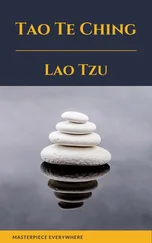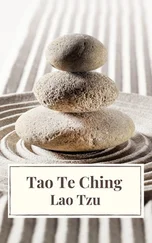And then calmly, and with tact,
For he finds no beauty in them.
Whoever finds beauty in weapons
Delights in the slaughter of men;
And who delights in slaughter
Cannot content himself with peace.
So slaughters must be mourned
And conquest celebrated with a funeral.
The Way has no true shape,
And therefore none can control it.
If a ruler could control the Way
All things would follow
In harmony with his desire,
And sweet rain would fall,
Effortlessly slaking every thirst.
The Way is shaped by use,
But then the shape is lost.
Do not hold fast to shapes
But let sensation flow into the world
As a river courses down to the sea.
Who understands the world is learned;
Who understands the self is enlightened.
Who conquers the world has strength;
Who conquers the self has harmony.
Who is determined has purpose;
Who is contented has wealth.
Who defends his home may long endure;
Who surrenders his home may long survive it.
The Way flows and ebbs, creating and destroying,
Implementing all the world, attending to the tiniest details,
Claiming nothing in return.
It nurtures all things,
Though it does not control them;
It has no intention,
So it seems inconsequential.
It is the substance of all things;
Though it does not control them;
It has no exception,
So it seems all-important.
The sage would not control the world;
He is in harmony with the world.
If you offer music and food
Strangers may stop with you;
But if you accord with the Way
All the people of the world will keep you
In safety, health, community, and peace.
The Way lacks art and flavour;
It can neither be seen nor heard,
But its benefit cannot be exhausted.
To reduce someone's influence, first expand it;
To reduce someone's force, first increase it;
To overthrow someone, first exalt them;
To take from someone, first give to them.
This is the subtlety by which the weak overcome the strong:
Fish should not leave their depths,
And swords should not leave their scabbards.
The Way takes no action, but leaves nothing undone.
When you accept this
The world will flourish,
In harmony with nature.
Nature does not possess desire;
Without desire, the heart becomes quiet;
In this manner the whole world is made tranquil.
Well established hierarchies are not easily uprooted;
Closely held beliefs are not easily released;
So ritual enthralls generation after generation.
Harmony does not care for harmony, and so is naturally attained;
But ritual is intent upon harmony, and so can not attain it.
Harmony neither acts nor reasons;
Love acts, but without reason;
Justice acts to serve reason;
But ritual acts to enforce reason.
When the Way is lost, there remains harmony;
When harmony is lost, there remains love;
When love is lost, there remains justice;
But when justice is lost, there remains ritual.
Ritual is the end of compassion and honesty,
The beginning of confusion;
Belief is a colourful hope or fear,
The beginning of folly.
The sage goes by harmony, not by hope;
He dwells in the fruit, not the flower;
He accepts substance, and ignores abstraction.
In mythical times all things were whole:
All the sky was clear,
All the earth was stable,
All the mountains were firm,
All the riverbeds were full,
All of nature was fertile,
And all the rulers were supported.
But, losing clarity, the sky tore;
Losing stability, the earth split;
Losing strength, the mountains sank;
Losing water, the riverbeds cracked;
Losing fertility, nature disappeared;
And losing support, the rulers fell.
Rulers depend upon their subjects,
The noble depend upon the humble;
So rulers call themselves orphaned, hungry and alone,
To win the people's support.
The motion of the Way is to return;
The use of the Way is to accept;
All things come from the Way,
And the Way comes from nothing.
When the great man learns the Way, he follows it with diligence;
When the common man learns the Way, he follows it on occasion;
When the mean man learns the Way, he laughs out loud;
Those who do not laugh, do not learn at all.
Therefore it is said:
Who understands the Way seems foolish;
Who progresses on the Way seems to fail;
Who follows the Way seems to wander.
For the finest harmony appears plain;
The brightest truth appears coloured;
The richest character appears incomplete;
The bravest heart appears meek;
The simplest nature appears inconstant.
The square, perfected, has no corner;
Music, perfected, has no melody;
Love, perfected, has no climax;
Art, perfected, has no meaning.
The Way can be neither sensed nor known:
It transmits sensation and transcends knowledge.
The Way bears sensation,
Sensation bears memory,
Sensation and memory bear abstraction,
And abstraction bears all the world;
Each thing in the world bears feeling and doing,
And, imbued with mind, harmony with the Way.
As others have taught, so do I teach,
"Who loses harmony opposes nature";
This is the root of my teaching.
Water overcomes the stone;
Without substance it requires no opening;
This is the benefit of taking no action.
Yet benefit without action,
And experience without abstraction,
Are practiced by very few.
Health or reputation: which is held dearer?
Health or possessions: which has more worth?
Profit or loss: which is more troublesome?
Great love incurs great expense,
And great riches incur great fear,
But contentment comes at no cost;
Who knows when to stop
Does not continue into danger,
And so may long endure.
Great perfection seems incomplete,
But does not decay;
Great abundance seems empty,
But does not fail.
Great truth seems contradictory;
Great cleverness seems stupid;
Great eloquence seems awkward.
As spring overcomes the cold,
And autumn overcomes the heat,
So calm and quiet overcome the world.
When a nation follows the Way,
Horses bear manure through its fields;
When a nation ignores the Way,
Horses bear soldiers through its streets.
There is no greater mistake than following desire;
There is no greater disaster than forgetting contentment;
There is no greater sickness than seeking attainment;
But one who is content to satisfy his needs
Finds that contentment endures.
Without taking a step outdoors
You know the whole world;
Without taking a peep out the window
You know the colour of the sky.
The more you experience,
The less you know.
The sage wanders without knowing,
Sees without looking,
Читать дальше
![Lao Zi Dao De Jing [Tao Te Ching] (english) обложка книги](/books/3890/lao-zi-dao-de-jing-tao-te-ching-english-cover.webp)
![Lao Zi - Dao De Jing [Tao Te Ching] (chinese)](/books/3891/lao-zi-dao-de-jing-tao-te-ching-chinese-thumb.webp)
![Lao Zi - Dao De Jing [Tao Te Ching] (espanol)](/books/3892/lao-zi-dao-de-jing-tao-te-ching-espanol-thumb.webp)
![Автор неизвестен Эпосы, мифы, легенды и сказания - Самые лучшие английские легенды [The Best English Legends]](/books/34729/avtor-neizvesten-eposy-mify-legendy-i-skazaniya-s-thumb.webp)








